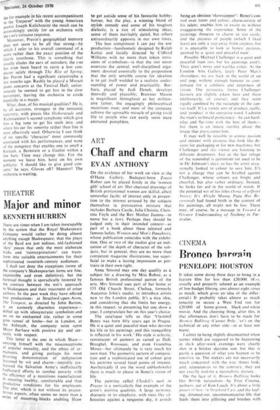THEATRE
Major and minor
KENNETH HURREN
There are times when I am taken inescapably by the notion that the Royal Shakespeare Company would rather be doing almost anything except Shakespeare; that the plays of the Bard are just tedious, old-fashioned 'duty' pieces that only the most elaborate tricks and 'reinterpretations' can trans- form into suitable entertainments for their sophisticated twentieth-century audiences.
I shall not deny the exceptions (some of the company's Shakespearian items are fine, responsible and even definitive), but the heretical thought is sporadically fostered by the contrast between the use's approach to Shakespeare and their treatment of other authors. In the past week they have.offered two productions: at Stratford-upon-Avon, The Tempest, as directed by John Barton, is an austerely charmless experience— dolled up with idiosyncratic symbolism and set on no enchanted isle, rather in some grim tunnel of limbo—but in London, at the Aldwych, the company seize upon Major Barbara with positive joy and cer- tainly with respect. This latter is the one in which Shaw— amusing himself with the misconceptions of popular morality, and the ethics of ar- maments, and giving perhaps his most diverting demonstration of indignation leavened by wit and charm—impishly jux- taposed the Salvation Army's ineffectually haphazard efforts to combat poverty with the efficiency of a munitions manufacturer in ensuring healthy, comfortable and thus productive conditions for his employees. The plot, which is not without its prepos- terous aspects, often seems no more than a series of mounting-blocks enabling Shaw
to get astride some of his favourite hobby- horses; but the play, a winning blend of stylish comedy and some of his toughest dialectic, is a riot of stimulating ideas, some of them inevitably dated, but others extraordinarily apposite in our own times.
The best compliment I can pay the ttsc production—handsomely designed by Ralph Koltai and lucidly directed by Clifford Williams with no more than token intru- sions of symbolism—is that the riot never overruns the central, well-disciplined argu- ment, devoted essentially to the proposition that the only sensible course for idealism is to get itself wedded to a realistic under- standing of power and practicality. Bar- bara, played by Judi Dench, develops shrewdly and plausibly; Brewster Mason is magnificent throughout as her million- aire father, the engagingly philosophical munitions man; and most of the company achieve the agreeable miracle of giving vivid life to people who can easily seem mere animated pamphlets.














































 Previous page
Previous page